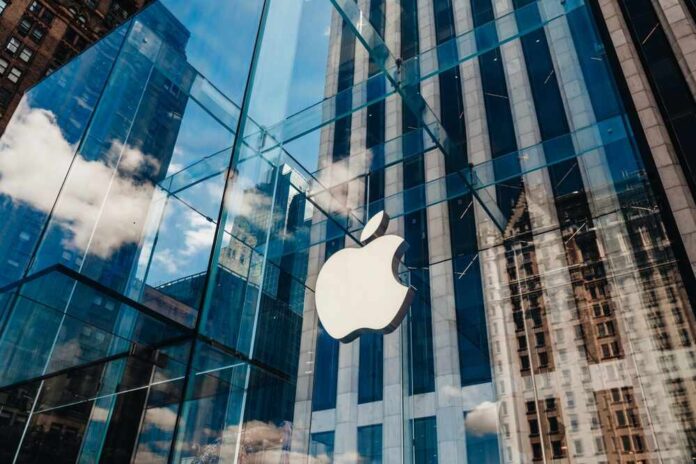Federal Judge Yvonne Gonzalez Rogers blasts Apple CEO Tim Cook for deliberately ignoring internal advice and potentially misleading the court in a stunning escalation of the tech giant’s years-long legal battle with Epic Games.
Key Takeaways
- Apple CEO Tim Cook faces judicial criticism for ignoring internal recommendations to comply with a 2021 antitrust injunction in the Epic Games case
- Apple has blocked Fortnite’s return to both the U.S. App Store and EU platforms despite court rulings and new EU digital market laws
- Judge Rogers ordered Apple to justify its non-compliance by Wednesday, with a hearing set for May 27 if the issue remains unresolved
- Apple’s vice president of finance Alex Roman has been accused of lying under oath during trial proceedings
- The case could fundamentally alter Apple’s App Store commission structure and developer policies
Apple Leadership Under Fire
In a dramatic development that threatens Apple’s tight control over its App Store ecosystem, U.S. District Judge Yvonne Gonzalez Rogers has ordered the tech giant to explain its apparent refusal to comply with a 2021 antitrust injunction. The judge specifically called out CEO Tim Cook and his executive team for disregarding internal recommendations that advised compliance with the court’s previous ruling. This legal confrontation stems from Epic Games’ ongoing battle to break Apple’s stranglehold on iOS app distribution and payment processing.
The judge’s criticism extends beyond mere non-compliance, as she also accused Apple’s vice president of finance, Alex Roman, of potentially committing perjury during trial testimony. These serious allegations suggest Apple may have deliberately misled the court about its App Store policies and practices. Apple now faces a deadline to respond to Epic’s enforcement motion by Wednesday, with a court hearing scheduled for May 27 if the parties cannot resolve.
“Now, sadly, Fortnite on iOS will be offline worldwide until Apple unblocks it,” stated Epic Games.
Epic’s Legal Challenge Intensifies
The confrontation began in 2020 when Epic Games deliberately violated Apple’s App Store terms by implementing its payment system in Fortnite, bypassing Apple’s 30% commission. Apple promptly removed Fortnite from its platform and terminated Epic’s developer account. While the 2021 ruling largely favored Apple, it did include an injunction requiring Apple to allow developers to include links directing users to alternative payment methods outside the App Store ecosystem – a provision Apple has resisted implementing properly.
Epic Games hoped to return Fortnite to iOS following both the U.S. court ruling and the implementation of the European Union’s Digital Markets Act, which mandates greater platform openness. However, Apple has blocked Epic’s attempts to bring Fortnite back to both markets. Epic argues that Apple is using app review processes and notarization requirements to circumvent both the court injunction and the EU’s new digital market laws, effectively maintaining its monopolistic control.
Apple’s Resistance Tactics
According to court documents, Apple has employed several strategies to resist complying with the spirit of the injunction. The company has demanded that Epic submit separate versions of Fortnite for the U.S. and EU markets, despite this contradicting Apple’s guidelines. Epic notified Apple of its intention to use the same developer account for both submissions, but Apple has refused to process the applications, citing Epic’s previous contract violations as justification for blocking the game’s return to its platforms.
“Yesterday afternoon, Apple broke its week-long silence on the status of our app review with a letter saying they will not act on the Fortnite app submission until the Ninth Circuit Court rules on the partial stay. We believe this violates the Court’s Injunction and we have filed a second Motion to Enforce Injunction with the US District Court for the Northern District of California.” – Epic Games
Broader Implications for App Store Economics
This case represents more than just a dispute between two companies – it could fundamentally reshape how digital marketplaces operate. At stake is Apple’s highly profitable App Store business model, which generates billions in revenue through its commission structure. If forced to allow developers to use alternative payment systems without restrictions, Apple could see significant revenue loss as major developers direct customers to payment options that bypass Apple’s fees completely.
The outcome will likely influence how other digital platforms structure their marketplaces and payment systems. Beyond the financial impact, the case highlights the growing tension between platform owners who argue they need control to ensure security and quality, and developers who claim these restrictions primarily serve to protect platform monopolies and excessive profit margins. President Trump’s administration has shown interest in addressing big tech monopolistic behaviors, making this case particularly significant in the current regulatory environment.
“The parties’ recent disputes over the District Court’s injunction do not diminish Apple’s bases and legal right to terminate Epic Games’ DPLA. To the contrary, the District Court’s recent Order reiterated Epic Games’ admission that it breached the DPLA and had previously conceded that Apple would be entitled to relief if the Court found that the DPLA was enforceable and did not violate antitrust laws or public policy,” stated Apple.











